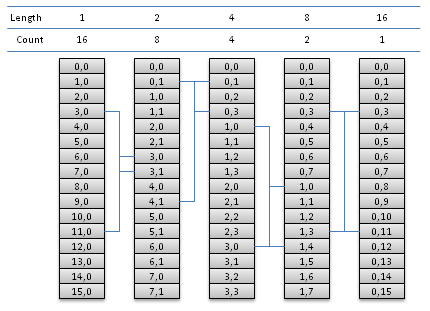OpenCL Fast Fourier Transform
Eric Bainville - May 2010A simple radix-2 kernel
As a starting point, we will implement a simple out of place radix-2 where, at each step, all sequences are stored in contiguous entries of the arrays.

If we run one thread for each butterfly taking indices i and i+N/2 as inputs, all memory read operations will always be coalesced (1 single memory access per group of 16 threads executed at the same time) as soon as N/2 is large enough. Memory write operations will be coalesced for all iterations but the first few.
The kernel operates on buffer x and stores the output in y. The next iteration is then called with (y,x), etc.
Let's first define some useful macros and functions, operating on complex numbers stored as float2:
// a*b => a, b unchanged #define MUL(a,b,tmp) { tmp=a; a.x=tmp.x*b.x-tmp.y*b.y; a.y=tmp.x*b.y+tmp.y*b.x; } // DFT2(a,b) => (a,b) #define DFT2(a,b,tmp) { tmp=a-b; a+=b; b=tmp; } // Return cos(alpha)+I*sin(alpha) float2 exp_alpha(float alpha) { float cs,sn; sn = sincos(alpha,&cs); return (float2)(cs,sn); }
The radix-2 kernel is then:
// N = size of input, power of 2. // T = N/2 = number of threads. // I = index of current thread, in 0..T-1. // DFT step, input is X[N] and output is Y[N]. // P is the length of input sub-sequences, 1,2,4,...,N/2. // Cell (S,K) is stored at index S*P+K. __kernel void fft_radix2(__global const float2 * x,__global float2 * y,int p) { int i = get_global_id(0); // number of threads int t = get_global_size(0); // current thread int k = i & (p-1); // index in input sequence, in 0..P-1 // Input indices are I and I+T. float2 u0 = x[i]; float2 u1 = x[i+t]; // Twiddle input (U1 only) float2 twiddle = pow_theta(k,p); float2 tmp; MUL(u1,twiddle,tmp); // Compute DFT DFT2(u0,u1,tmp); // Output indices are J and J+P, where // J is I with 0 inserted at bit log2(P). int j = (i<<1) - k; // = ((i-k)<<1)+k y[j] = u0; y[j+p] = u1; }
This kernel must be called for p=1, then p=2, etc. until p=N/2. The number of threads at each call is N/2, and the work group size WG doesn't matter since all threads are independent. We need to insert a barrier between two kernel execution, to make sure the output array is updated before being used as input in the next call.
For N=224, this kernel requires 24 iterations. We measure the lowest execution time for all feasible values of the work-group size:
| Radix-2 | GTX285 | HD5870 |
|---|---|---|
| Best time | 54 ms | 73 ms |
| Shortest iteration | 2.0 ms | 2.6 ms |
The ATI compiler does a much better job when using vector types and functions, and the NVidia compiler handles them equally. We will pack one complex number in a float2: (re(a),im(a)), two complex numbers in a float4: (re(a),im(a),re(b),im(b)), etc. The vector of real parts of x is then x.even, and imaginary parts are x.odd.
Let's define some functions handling these representations:
// Complex product, multiply vectors of complex numbers #define MUL_RE(a,b) (a.even*b.even - a.odd*b.odd) #define MUL_IM(a,b) (a.even*b.odd + a.odd*b.even) float2 mul_1(float2 a,float2 b) { float2 x; x.even = MUL_RE(a,b); x.odd = MUL_IM(a,b); return x; } float4 mul_2(float4 a,float4 b) { float4 x; x.even = MUL_RE(a,b); x.odd = MUL_IM(a,b); return x; } // Return the DFT2 of the two complex numbers in vector A float4 dft2_2(float4 a) { return (float4)(a.lo+a.hi,a.lo-a.hi); } // Return cos(alpha)+I*sin(alpha) (3 variants) float2 exp_alpha_1(float alpha) { float cs,sn; // sn = sincos(alpha,&cs); // sincos cs = native_cos(alpha); sn = native_sin(alpha); // native sin+cos // cs = cos(alpha); sn = sin(alpha); // sin+cos return (float2)(cs,sn); }
Using these functions, we get the following compact kernel:
// Radix-2 kernel __kernel void fft_radix2(__global const float2 * x,__global float2 * y,int p) { int i = get_global_id(0); // number of threads int t = get_global_size(0); // current thread int k = i & (p-1); // index in input sequence, in 0..P-1 x += i; // input offset y += (i<<1) - k; // output offset float4 u = dft2( (float4)( x[0], mul_1(exp_alpha_1(-M_PI*(float)k/(float)p),x[t]) )); y[0] = u.lo; y[p] = u.hi; }
We measured the 3 variants to compute (cos(α),sin(&alpha)):
| Radix-2 with vectors | GTX285 | HD5870 |
|---|---|---|
| sincos | 53 ms | 59 ms |
| sin+cos | 55 ms | 77 ms |
| native sin+cos | 56 ms | 68 ms |
It is interesting to note that the iteration time corresponds to memory read+write time. An immediate optimization would be to process several iterations in the same kernel. This option will be developed in the next page: Radix 4,8,16,32 kernels.
| OpenCL FFT (OLD) : Reference implementations | Top of Page | OpenCL FFT (OLD) : Radix 4,8,16,32 kernels |
